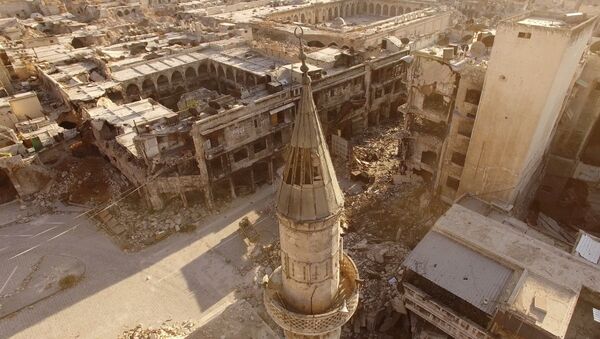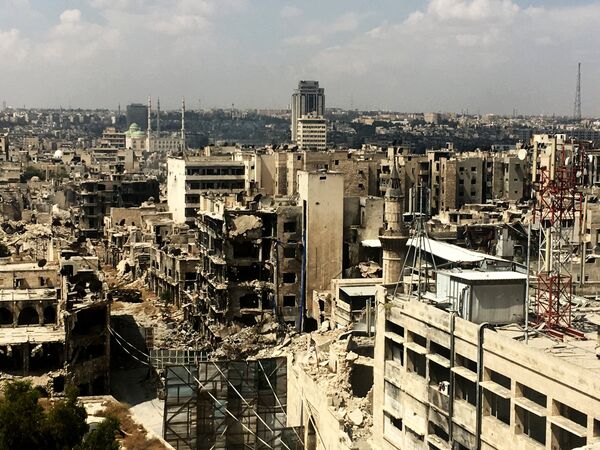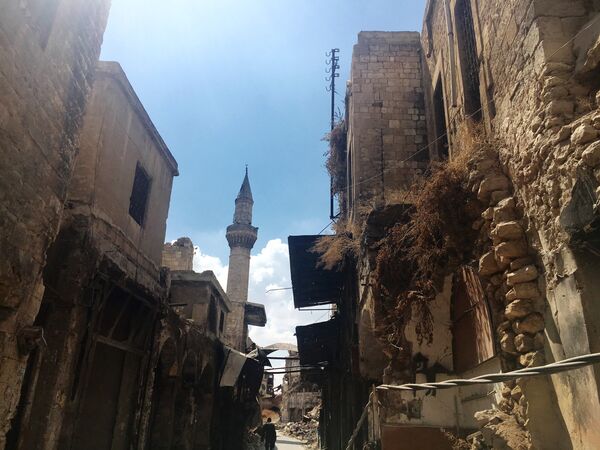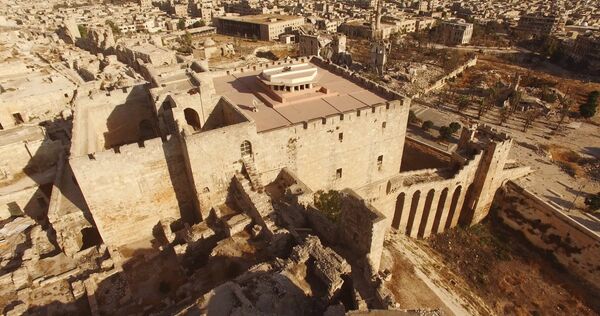The Syrian city of Aleppo, often referred to as the 'northern capital', has recently been in the headlines due to a government assault on the terrorists' positions in the east of the city.

The Syrian government army has under control almost half of the city, however much of its eastern neighborhood with over 200,000 people is still in the hands of the radical groups.
On Tuesday, the Syrian Arab Army (SAA) with people's militia units advanced into the historic area of the city, retaking the Farafira District in the east of Aleppo.

RIA Novosti correspondent Mikhail Alaeddin has met with the people on the ground to find out what they think of the Russian involvement in the Syrian conflict.
"Last winter the situation in the city was critical for a number of weeks. Daesh terrorists captured the town of Hanaser blocking the main highway and cutting off the supply artery, the so-called "Road of life" into two million-populated Aleppo," the reporter writes in his article for RIA Novosti website.
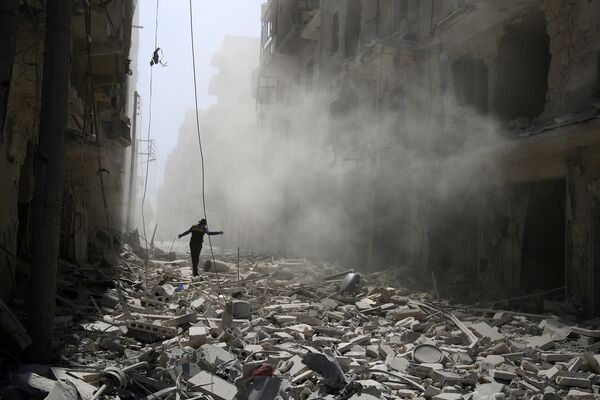
"I participated in the liberation of Hanaser. We have been trying to retake control over the settlement for over three weeks to be able to resume the supply of Aleppo," Haj Neynava, one the the fighters of Lebanon's Hezbollah movement supporting the Syrian government forces told the reporter.
"The Russian jets have not left us for a single day. Thanks to the Russian pilots we were able to avoid massive losses and relatively quickly completed our misson," he added while the two talked at the Shiite observation point in the 1070 district in southwestern Aleppo.
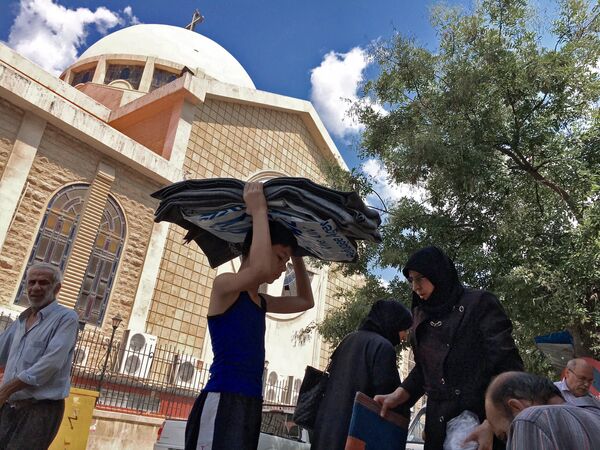
The armed groups of militants, totalling up to 8,000 terrorists, started their assault on Aleppo from its southern and south-western outskirts at the beginning of August.
However, over 1,500 were eliminated in the first four days of their offensive.
Every day, Russian and Syrian aircraft eliminated caravans of radicals moving towards Aleppo from Idlib Governorate. The Syrian troops with the aerial support of Russian aviation were not only able to repel the attacks of the terrorists but were able to counter-attack and liberate the territories of the artillery schools, part of 1070 district and Ramouseh suburb, the gates to the city's supply route in the south.
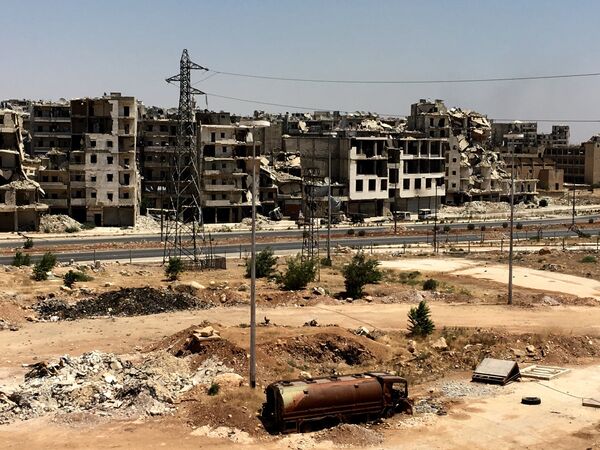
"We wouldn't have been sitting here now. Probably, there wouldn't have been any Aleppo at all. It is walking distance from here to its western neighborhood," chipped in Syrian Captain Mukhannad, as he joined the two men in an underground basement of the observation facility.
"We would have been squeezed and encirlcled, I absolutely agree with you, if not for the Russian jets. They gifted us and our people with the firm hope for victory," the captain added, sipping hot mint tea and eating a piece of spinach pie.
Captain Mukhannad is serving in the Special Forces. Before the war he was a pilot flying Czech trainer aircraft L-39. The captain did not elaborate why he left it for the infantry however recalled that once he was allowed to fly a Russian SU-24.
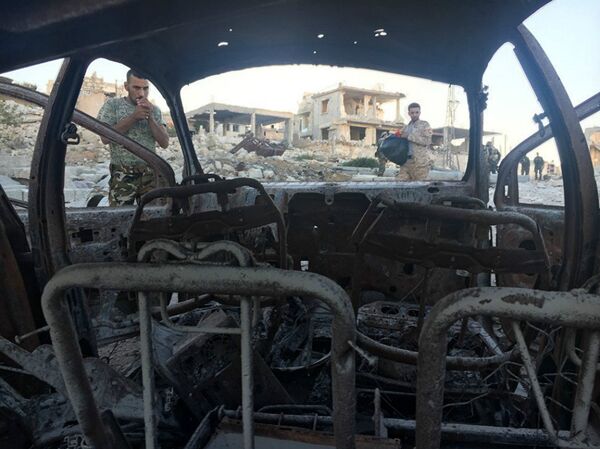
"You have great aircraft and experts with God-given talent. When I was a student, Russian officers came to teach us how to operate Russian-made jets. Russian officers are men of their words. It is only true now when Moscow said it won't leave us, it hasn't left us and keeps helping us in every possible way," he said.
1070 District is an apartment project in southwestern Aleppo, named so due to the number of the apartments. Not all of them were finished before the military actions moved to this part of the country.
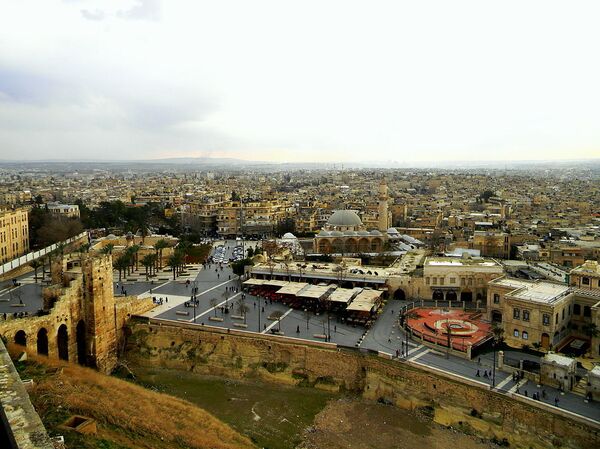
There are many residential blocks on the outskirts of the city. Aleppo was growing fast before the war and Syrians called it, before the war, the economic capital of the country.
It had the largest industrial center in the Middle East and the local residents recall that as soon it was captured by the terrorists the equipment from the thousands of plants have been dismantled and moved to Turkey.
In the north of the city the situation is no less tense than in the south. Over a dozen of groups led by al-Nusra Front attempted to storm Aleppo in July through al-Malah Farms alongside the Castello Road.
The Syrian infantry with the aerial support of the Russian and Syrian aviation was able to repel four waves of terrorist attacks and then counter-attacked and retook full control over the road, blocking the main supply route of terrorists in Aleppo and opening a new supply route of the city through the neighborhood of Bani Zeid.

But the militants were not so easily beaten and were able to capture the Ramouseh suburb in the south by then and to completely isolate the western Aleppo.
Thanks to the success at the northern front, the isolation lasted for only three days.
Now the humanitarian trucks are delivering aid to Aleppo through its northern and southern gates, for the first time since 2013.
Everyday life in the parts controlled by the government forces is gradually returning back to normal. The Syrian army, having repelled the militants on the city's major routes, has begun the cleanup of the city.
Syrian servicemen have started installing artillery positions and checkpoints in the city. The reporter notes that the militants must have been retreating in a hurry, leaving behind ammunition and some weaponry.
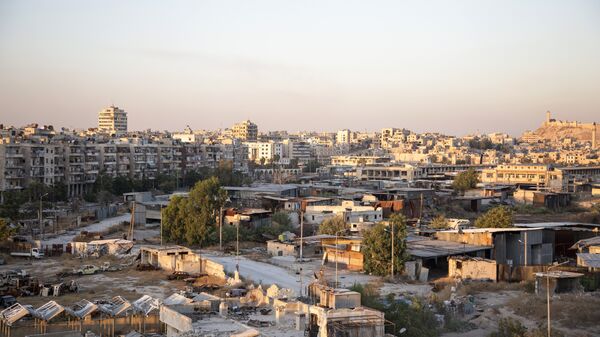
"Unfortunately here we have to fight without the aerial support of the Russian aviation," Syrian Colonel Hatem explains to Mikhail Alaeddin.
"It is a high-density area, inhabited by many civilians, thus the Russian pilots are bombing the convoys of terrorists outside Aleppo, and it is also of great support," he said.
The Syrian Air Forces, he said, are destroying the command centers and the positions of the terrorists on the outskirts of the residential areas.
"It is really pinpoint accuracy," he said.
However the assault of the government troops is going rather slowly as they afraid that the terrorists use the civilians as human shields.
In order to escape the airstrikes, the radicals move their arms dumps and command centers into mosques, schools and densely-populated areas. They know only too well that the air forces won't put civilians at risk.
Mikhail Alaeddin and Colonel Hatem then go to Aleppo Christian quarter of AL Aziziya. Colonel Hatem straightforwardly asks a young female waiter whether she would want the Russian aviation to halt their flights above the city.
"When we learnt in spring that Russia had finished its operation in Syria, the first thought was "that's the end." The militants would come here. But thank God, Russia didn't leave us. My soul is at peace when I hear the aircraft in the sky. And that is the sad truth," answered the young lady.
'The Syrian People Know Who the Real Terrorists Are'
Two elderly men were playing nardes (backgammon) nearby and were distracted by the conversation.
"Let pseudo-Muslims write and say whatever they want. They are murderers," one of the players told the reporter.
"They continue their mass executions of Christians and Muslims. There is at least one family member killed by them in every family here. They are trying to wash off the blood from their hands by blaming the Russians and the Syrian government," he said.
"The Syrian people know who the real terrorists are. Thank Russia and the Syrian army from all the residents of Aleppo," he said while his partner was nodding approvingly.
Alaeddin noted that throughout the whole day he spent in Aleppo questioning the residents about Russia's aerial operation in Syria, none of the people he talked to wanted Russia to leave their country.
Both the servicemen and civilians, who have been living in crises for over five years believe that without the Russian aid they would have lost thier houses and probably their lives a year ago already.

